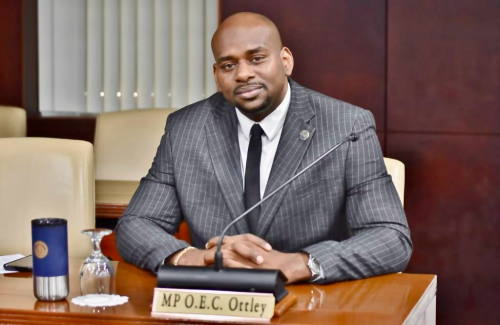 PHILIPSBURG:--- “It was just a few months ago that the Minister of Finance came to parliament and asked for the approval of the Ennia bailout, which was caused mainly due to the negligence of the Central Bank of Curacao and St. Maarten,” said Ottley. His recent disapproval of the Central Bank and their appointment of Dr. Jose Jardim as Chief Executive Officer (CEO) of Banco di Caribe, citing what he describes as a blatant conflict of interest and deeply concerning past conduct tied to Dr. Jardim's role in the 2022 sale of the same institution.
PHILIPSBURG:--- “It was just a few months ago that the Minister of Finance came to parliament and asked for the approval of the Ennia bailout, which was caused mainly due to the negligence of the Central Bank of Curacao and St. Maarten,” said Ottley. His recent disapproval of the Central Bank and their appointment of Dr. Jose Jardim as Chief Executive Officer (CEO) of Banco di Caribe, citing what he describes as a blatant conflict of interest and deeply concerning past conduct tied to Dr. Jardim's role in the 2022 sale of the same institution.
The member of parliament expressed that he became extremely concerned after the Minister of Finance in Curacao expressed his recent disapproval of the Central Bank and their appointment of Dr. Jose Jardim as Chief Executive Officer (CEO) of Banco di Caribe, citing what he describes as a blatant conflict of interest and deeply concerning past conduct tied to Dr. Jardim's role in the 2022 sale of the same institution.
“I am happy to see that Minister Gumbs has voiced her opinion on that matter, as the previous silence from the minister had me very concerned,” said Ottley.
After some extensive research, MP Ottley questions if Article 23, Paragraph 2(a) of the National Ordinance on the Supervision of Banking and Credit Institutions was violated. This article prohibits the appointment of individuals to key policy-making roles within a credit institution without prior approval from the Central Bank. While the Central Bank did grant approval in this case, MP Ottley agrees that the approval never should have been given without a 'cooling-off' period of at least a year due to clear conflicts of interest arising from Dr. Jardim’s former regulatory role.
MP Ottley acknowledges the response of the Central Bank to Minister Silvania’s concerns and states that the articles are clear, and it’s hard to have complete faith in the institutions, given the past neglect that has greatly affected the two countries.
“These international norms are not theoretical—they are practical guardrails meant to protect financial systems from undue influence and reputational harm. CBCS should have followed these standards instead of facilitating a questionable transition that weakens institutional credibility,” Ottley said.
This is another example of why our current government should not just go along to get along. The Central Bank falls under the jurisdiction of the two countries, Curacao and St. Maarten, and has taken no responsibility for the Ennia Saga, while the people of St. Maarten were forced to inject millions into the bailout.
The financial institutions in St. Maarten are abusing our people day by day with added fees and complex measures, yet no talk of banking reform and consumer protection from the Minister of Finance, while there was already a proposal submitted by the UPP faction.
“The public must have confidence that our financial institutions are governed with independence, transparency, and integrity. Anything less puts our entire system at risk,” Ottley concluded.









